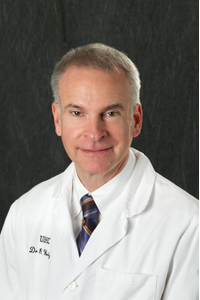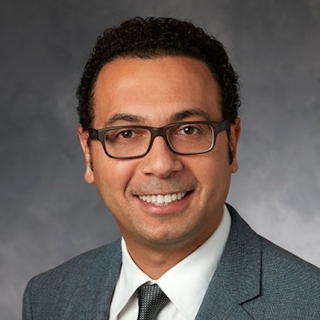 Department Chair Dr. Mary Hawn in conjunction with the San Jose Surgical Society hosts the new George B. Armanini Lecture. Dr. Ron Weigel is Chair of the Department of Surgery at the University of Iowa.
Department Chair Dr. Mary Hawn in conjunction with the San Jose Surgical Society hosts the new George B. Armanini Lecture. Dr. Ron Weigel is Chair of the Department of Surgery at the University of Iowa.
 Dr. Ehab Sorial is a Clinical Associate Professor in the Division of Vascular Surgery.
Dr. Ehab Sorial is a Clinical Associate Professor in the Division of Vascular Surgery.
 Weekly Work-In-Progress
Weekly Work-In-Progress
Presented by:
Brooke Gurland, MD
Clinical Professor, General Surgery
Stanford University Medical Center
Title: “App-Based Physical Therapy Coaching for Pelvic Floor Disorders and Stroke Rehabilitation.”
For dial-in instructions, please contact Ana Mezynski at mezynski@stanford.edu
 Fatima Cody Stanford, MD, MPH, MPA, FAAP, FACP, FAHA, FTOS is an obesity medicine physician scientist, educator, and policy maker at Massachusetts General Hospital and Harvard Medical School.
Fatima Cody Stanford, MD, MPH, MPA, FAAP, FACP, FAHA, FTOS is an obesity medicine physician scientist, educator, and policy maker at Massachusetts General Hospital and Harvard Medical School.
 Weekly Work-In-Progress
Weekly Work-In-Progress
Presented by:
Tom Handley, MD
Knight-Hennessy Scholar
Stanford University
Title: Cost-effectiveness of Dapagliflozin for Non-Diabetic Chronic Kidney Disease
Bio: Tom Handley is an MD from the UK. He is a Knight-Hennessy Scholar studying for a master’s degree in Health Policy, with specific interests in transplant policy and optimization.
For dial-in instructions, please contact Ana Mezynski at mezynski@stanford.edu

Presented by:
Chuck Huber, PhD
Director of Statistical Outreach, StataCorp
Adjunct Associate Professor of Biostatistics
Texas A&M School of Public Health
This curriculum is designed to support beginner, intermediate, and advanced “Stata” users. The courses do not require registration and can accommodate up to 300 participants. The most recent and advanced version, Stata-16, integrates Python with Stata.
We strongly encourage you to participate!
Bio: Chuck Huber is Director of Statistical Outreach at StataCorp and Adjunct Associate Professor of Biostatistics at the Texas A&M School of Public Health. Most of his current work is focused on statistical methods used by behavioral and health scientists. He has published in the areas of neurology, human and animal genetics, alcohol and drug abuse prevention, nutrition, and birth defects. Dr. Huber currently teaches introductory biostatistics at Texas A&M where he previously taught categorical data analysis, survey data analysis, and statistical genetics.
Please direct questions to Lakshika Tennakoon, Data Scientist, Division of Trauma and Acute Care, Department of Surgery at lakshika@stanford.edu

Presented by:
Chuck Huber, PhD
Director of Statistical Outreach, StataCorp
Adjunct Associate Professor of Biostatistics
Texas A&M School of Public Health
This curriculum is designed to support beginner, intermediate, and advanced “Stata” users. The courses do not require registration and can accommodate up to 300 participants. The most recent and advanced version, Stata-16, integrates Python with Stata.
We strongly encourage you to participate!
Bio: Chuck Huber is Director of Statistical Outreach at StataCorp and Adjunct Associate Professor of Biostatistics at the Texas A&M School of Public Health. Most of his current work is focused on statistical methods used by behavioral and health scientists. He has published in the areas of neurology, human and animal genetics, alcohol and drug abuse prevention, nutrition, and birth defects. Dr. Huber currently teaches introductory biostatistics at Texas A&M where he previously taught categorical data analysis, survey data analysis, and statistical genetics.
Please direct questions to Lakshika Tennakoon, Data Scientist, Division of Trauma and Acute Care, Department of Surgery at lakshika@stanford.edu

Presented by:
Chuck Huber, PhD
Director of Statistical Outreach, StataCorp
Adjunct Associate Professor of Biostatistics
Texas A&M School of Public Health
This curriculum is designed to support beginner, intermediate, and advanced “Stata” users. The courses do not require registration and can accommodate up to 300 participants. The most recent and advanced version, Stata-16, integrates Python with Stata.
We strongly encourage you to participate!
Bio: Chuck Huber is Director of Statistical Outreach at StataCorp and Adjunct Associate Professor of Biostatistics at the Texas A&M School of Public Health. Most of his current work is focused on statistical methods used by behavioral and health scientists. He has published in the areas of neurology, human and animal genetics, alcohol and drug abuse prevention, nutrition, and birth defects. Dr. Huber currently teaches introductory biostatistics at Texas A&M where he previously taught categorical data analysis, survey data analysis, and statistical genetics.
Please direct questions to Lakshika Tennakoon, Data Scientist, Division of Trauma and Acute Care, Department of Surgery at lakshika@stanford.edu
 Zara Cooper, MD, MSc is an acute care surgeon, trauma surgeon, and surgical intensivist certified in palliative medicine at Brigham and Women’s Hospital in Boston.
Zara Cooper, MD, MSc is an acute care surgeon, trauma surgeon, and surgical intensivist certified in palliative medicine at Brigham and Women’s Hospital in Boston.